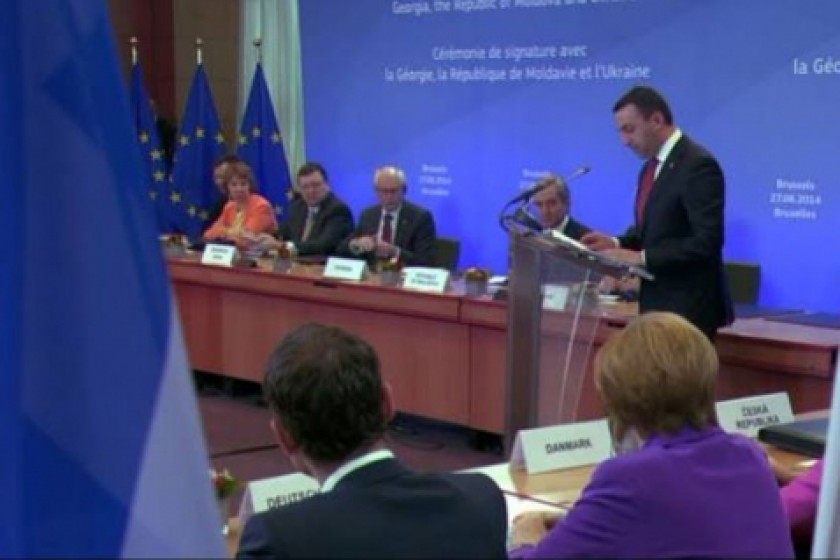Ukraine, Georgia and Moldova have signed the Association Agreement with the EU.
The ceremony was held in the premises of the EU Council in Brussels at 10:00 am (local time).
European Commission President José Manuel Barroso has hailed as a historic day today’s signature of the Association Agreements with Georgia, Moldova and Ukraine. He said the agreements were the most ambitious the EU had entered into so far, and marked a landmark in the EU’s Eastern Partnership policy.
Speaking at the signing ceremony, Barroso said it was a historic day “for the three countries themselves, for the European Union and for the whole of Europe”.
“For our three partners, it is a recognition of the significant progress made over recent years and of their strong political determination to come closer to the European Union; their shared outlook on a prosperous economic model; and their desire to live by the European spirit and with European values.”
“For the European Union, it is a solemn commitment to support Georgia, the Republic of Moldova and Ukraine, each step of the way, along the road of transforming their countries into stable, prosperous democracies.”
President Barroso said the Association Agreements were the outcome of a path started more than 20 years ago when these countries became independent states.
“These Agreements are also a landmark in our Eastern Partnership policy that set the objective of achieving political association and economic integration with our partners, who were willing and ready to do so.”
He added: “The Agreements we are signing today are the most ambitious the European Union has entered into so far. They will enable our partner countries to drive reforms, to consolidate the rule of law and good governance; and to give an impetus to economic growth in the region by granting access to the world's largest internal market and by encouraging cooperation across a wide range of sectors.”
He said the task ahead remained substantial: “To succeed will require strong political will. It will require effective coordination within each of the partner governments. It will require each of them to reach out to their parliaments, to opposition, to civil society in order to build a national consensus in favour of the measures required to guarantee a genuine and sustainable transformation.”
“No international agreement can ever replace the momentum and political leadership within the country itself,” Barroso added.
Key issues in the reform process included reforming the judiciary and public administration, he said, improving efficiency and transparency, and fighting corruption.
He insisted that the EU was not seeking an exclusive relationship with the three countries – the Agreements “are meant to add more momentum to our partners' established international relations, not to compete with - or intrude in - our partners' relations with any neighbour.”
Barroso said the EU was well aware of its partners' aspirations to go further and acknowledged their European choice. “As we have stated before, these agreements do not constitute the endpoint of the EU's cooperation with its partners. Quite the opposite. Signing these Association Agreements with Deep and Comprehensive Free Trade Areas should not be seen as the end of the road, but as the beginning of a journey on which the European Union and these three partner countries are embarking together today.”
Petro Poroshenko, the President of Ukraine, called the signature of the Association Agreement with the EU one of the most important days in the history of Ukraine. "It is one of the most important days since independence of Ukraine. We must use this opportunity to modernize the country but we need only one thing – peace and security," the President told journalists before the ceremony.
Source: http://www.enpi-info.eu/
If you found a typo you can notify us by selecting the text area and pressing CTRL+Enter

 Videos
Videos Photos
Photos
Write a comment